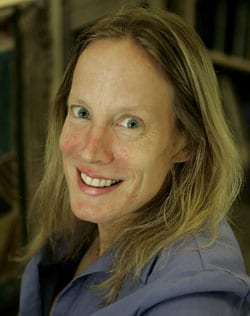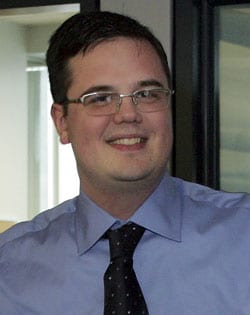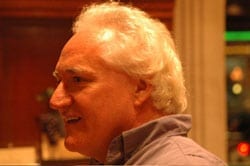Boston Globe, Canadian Broadcasting Corporation Journalists To be Honored by WHOI
September 30, 2005
Two journalists from The Boston Globe and a radio host/producer for Canadian Broadcasting Corporation will receive the 2005 Ocean Science Journalism Award from the Woods Hole Oceanographic Institution (WHOI) for excellence in communicating ocean science to the public.
Beth Daley and Gareth Cook of The Boston Globe are being recognized for their four-part newspaper series “Sea Change: The New England Fishing Crisis” about the New England fishing industry. Paul Kennedy, host/producer of the Canadian Broadcasting Corporation (CBC) Radio One program “Ideas,” was recognized for his eight-part series “Learning from the Oceans.”
The WHOI Ocean Science Journalism Award is given every other year in two categories, print and broadcast, and includes a cash prize and award. It will be presented October 13 in Woods Hole during the Institution’s fall meetings of the Board of Trustees and Corporation.
Beth Daley was born in New York and attended Northeastern University, graduating in 1989. After working for three years as a reporter at the Daily News in Newburyport, Massachusetts, she spent a year teaching English and traveling throughout Southeast Asia and Sri Lanka. She joined the Globe staff in 1995, writing features for the North Weekly section, and became the education reporter in September 1997. Daley has been covering the environment for the paper since August 2000, focusing her reporting on marine issues, forestry and a wide range of environmental policies not only in New England but throughout the country. After 9/11 she covered Ground Zero in New York City, the anthrax cases in Florida and the war in Pakistan and Afghanistan before returning to the environment beat in early 2002. In addition to the environment, Daley also covers space, including the Mars rover landings and the recent Space Shuttle mission.
Gareth Cook was graduated in 1991 from Brown University with two bachelor’s degrees, one in international relations and the other in mathematical physics. After passing the Foreign Service exams, he decided to pursue a career in journalism and served as an assistant editor at Foreign Policy magazine until 1993. The following year he covered mainly national politics as a reporter at U.S. News & World Report, moving in 1995 to work as an editor at the Washington Monthly. He left Washington in 1996 to serve as news editor of the Boston Phoenix, where he recruited a new staff and won several regional press awards.
In 1999 Cook joined The Boston Globe‘s city desk, serving first as the New England editor and later as Sunday Metro Editor, responsible for editing local and regional stories for the Sunday newspaper. In 2000 he moved to the Health/Science section, where he remains. Cook won the 2005 Pulitzer Prize for explanatory reporting for his coverage of the scientific and ethical dimensions of stem cell research.
Paul Kennedy, a native Canadian, is a veteran broadcaster well known to CBC Radio listeners. He received a B.A. degree in history from Queen’s University, a master of literature degree in history from the University of Edinburgh, Scotland, and has pursued postgraduate work at the University of Toronto, where he studied with media analyst Marshall McLuhan. Kennedy has produced and presented more than 200 documentaries for “Ideas” over the past 25 years. In 1999 he was named Host/Producer of the long-running radio series.
Kennedy researched and wrote his first documentary, “The Fur Trade Revisited”, for an “Ideas” series entitled “Red Man, White World”, in 1977. Since then, he has worked on a wide range of topics, including war crimes, Luddism, marathon running, salt, golf, the four-minute mile, Jerusalem, democracy in America, and single malt scotch whisky. His favorite project in 2005 was an hour-long investigation of “Oysters”. Among his many honors is a Peabody Award in 1989 for “Lost Innocence: The Children of World War II” which also won several NYC Festival awards and an ACTRA award, given to the best writer of a radio program in Canada.
The Woods Hole Oceanographic Institution Ocean Science Journalism Award was established to recognize an outstanding record of achievement in communicating ocean science to the public. It is intended to honor work that has made a significant and lasting contribution to public awareness of, interest in, and understanding of issues and advances in the ocean sciences and its impact on society as a whole. The award is judged by a panel of journalists from around the country representing print, broadcast and electronic media.
The cash prize and award in print and broadcast categories was first presented in the fall of 2003. Alastair Fothergill, Director of Development for the Natural History Unit of the British Broadcasting Corporation, was honored in the broadcast category for his work on the television series “Blue Planet: Seas of Life”. Robert Kunzig, a freelance correspondent for Discover, U.S. News & World Report and other magazines, was honored in the print category for his book Mapping the Deep: The Extraordinary Story of Ocean Science.”
# #



